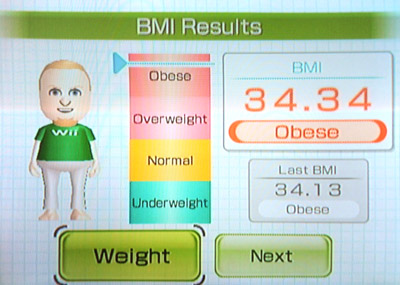So I bought a Wii Balance Board. I picked it up on the cheap and figured that it would make certain games (say, Punch Out!) a little more interesting. These strange Wii peripherals always confused me, but the death of the system lit a fire under me to collect as much Wii stuff as possible. Strange, I know, but there’s much fun to be had inside the wonderful world of Wii.
Except in the case of Wii Fit! See, Wii Fit does exactly what you’d expect it to do: tell you how to get in shape, help you set goals, and then hopefully meet them within a specific period of time. All well and good, right? It’s something akin to a digital exercise device that helps you maintain good posture and lose weight. On that note, apparently I favor my left leg over my right leg – who knew? This information actually helps you.
What DOES NOT HELP YOU, and I cannot stress this enough, is the body-mass index that the Balance Board measures. I would consider myself relatively healthy for the weights that I life, the cardio I do, and the intense sit-up regiment that I continually do nearly every day. Previously, to call me “chubby” would put the matter quite charitably, so I made quite a lot of progress since then. Wii Fit, then, should reflect this change in lifestyle, right? Well, BMI does not really measure weightlifting all that well. Bigger muscles also means more weight, so you can just about guess how that went. Since I don’t have a smart phone, some one else’s photo will do:
I’m in the 37 range so apparently I am worse off than this guy, but seriously, WOW. It certainly does not help that the anthropomorphic Wii Balance Board, once a friendly waving little chap, shakes his head at your perceived fatness and that cartoonish “wah wah” trumpet sound plays. Is Nintendo really serious right now? Are they fat shaming me? This does not seem family friendly, does it? But weight loss and health are serious business, I guess! I never thought I would say that about a Nintendo game, but what’s the purpose of this? Keep your children away from this device!
However, the implications of the BMI mean nothing to me. Rather, I think my first response says it all: an intense feeling of resistance to change. Honestly, I found that strange – rarely does one feel such a vehement opposition to a video game telling you what to do. Such entertainment describes to us the rules all the time, and we abide by these rules without hesitation. Rarely does a game play around with that trope, and when it does said “choices” still exist in the vernacular of the game’s initial design – it just replicates the feeling of choice. But this, this judgment on my health and well-being from “just a video game”, produces quite the reaction. I wouldn’t even call it verbal so much as a strong distaste or dislike for change.
All of this points to a perfectly simple point about human beings: we resist change. We do not like it, whether for rational introspective reasons or irrational resistance (probably biological at points) because we like the way we live. In fact, we’re naturally designed to enjoy and perceive regularity in the universe. Human beings form shapes and patterns, from our personal lives down to the entire function of our societies and bureaucracies, and we attempt to avoid changes at any waking opportunity. Even if we must change, we refuse to change, and whoever tells us to change turns into the target of our attack – even a video game! This also explains why we perceive science as a series of immutable rules, and religions in much the same way when it comes to Western culture – we put up new walls to resist change when change happened.
This may explain why the world forgot about Charles S. Peirce. He, a scientist and philosopher, proposed that the universe did not work according to fixed laws, but upon regularities and irregularities. As a geologist himself who worked out in the field, he did not see science in the methodological sense of fixed rules, but in the constant shift and flux of ever-changing variation. If you measure something a hundred times to the smallest degree with our human instruments, you won’t necessarily get the same result every single time. Rather, you’re more likely to get a distribution that hovers around a single point with outliers here and there (expected, of course). As our tools get more precise, it’s far more likely that we will see greater variations on that distribution! Just take a gander at quantum physics, and Peirce’s observations prove right.
Although the universe, as we know it, displays great measures of habit, it does not form itself into some deterministic law. Peirce called this “tychism”, in that there’s an element of chance to the working of the universe. We turn it into a law because we like order and hate chaos, as much a reflection of our created image as it is our sinful nature. In fact, we arrange ourselves to avoid change, and this involves all of our being. How strange, then, that the universe contains an element of chance, right? At the very least, a Christian rubric would turn this into “perceived” chance under our limit knowledge, but it exists nonetheless.
Given this, how do we avoid resistance to positive change? A few examples should suffice. First, Churches exist for a diversity of opinion and for a common goal. In that light, you should expect people to call each other out on their failings in a loving way, but sometimes you need to lay the hammer down. Paul did this to Peter, who appealed too heavily to Jewish populations at the exclusion of Gentiles:
11 But when Cephas came to Antioch, I opposed him to his face, because he stood condemned. 12 For prior to the coming of certain men from James, he used to eat with the Gentiles; but when they came, he began to withdraw and hold himself aloof, fearing the party of the circumcision. 13 The rest of the Jews joined him in hypocrisy, with the result that even Barnabas was carried away by their hypocrisy. 14 But when I saw that they were not straightforward about the truth of the gospel, I said to Cephas in the presence of all, “If you, being a Jew, live like the Gentiles and not like the Jews, how is it that you compel the Gentiles to live like Jews?
Sometimes, you need a heavy club rather than a pillow, and Galatians 2 shows us this pretty well. Of course, that’s in reference to ministry rather than personal change, so what else can we say in that regard? Pray for discernment and insight, even in your private life. I mean, Wii Fit certainly isn’t going to make or break my own personal life habits, but it’s surely a wake-up call. Perhaps I do need to shift some things around, including diet and otherwise. Perhaps your current methods aren’t the best, and they need to be reformed.
So yes, be open to change and improvement. Easier said than done, Christian or not, but that’s the real bottom line. Your initial response will always resist, but you must work around it.


